Icon of Switzerland still going strong at 125
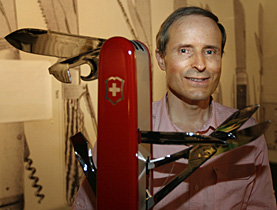
There's almost a boyish grin on the face of Carl Elsener Junior as he explains the success of the Swiss Army knife.
It’s hardly surprising when you consider that he has grown up with pocket knives and is carrying on the family tradition at Victorinox, the company that manufactures the knife.
As the company celebrates its 125th anniversary, the Forum of Swiss History in Schwyz, which is near the company factory in central Switzerland, is hosting a fascinating exhibition devoted to pocket knives throughout the ages.
“I think I really grew up in our factory and right from the beginning like most boys I was most proud of the Swiss Army knife,” Elsener, CEO and great grandson of the founder, told swissinfo.ch.
“I was especially proud of my first because I knew my father had made it.”
From its humble beginnings, the knife has become an icon. Most Swiss men possess art least one – because they were given one when they joined the militia army – if not several of them.
Shopping list
It’s on many tourists’ shopping list when they come to Switzerland and it advertises the notion of quality on many other Swiss products and services. They have also appeared on Swiss postage stamps.
Elsener says there are many different reasons why it has become such a symbol of the country; for him one stands out in particular.
“After the Second World War… we could sell them in huge quantities to the American soldiers who could buy them in the PX stores throughout Europe.
“They sent the knives as souvenirs back to their relatives and to their friends. For them to pronounce Schweizer Offiziersmesser was too difficult so they just called it Swiss Army knife.”
He points out that the knife has become a “reliable companion” for many expeditions, including to the North and South Poles, to the top of Mount Everest, and to the tropical rain forests of the Amazon. It is also standard equipment for Space Shuttle crews.
Presidential gift
“And powerful presidents have used the Swiss Army knife as a gift for their visitors at the White House,” he enthuses.
The company even received a visit from President George Bush and his wife Barbara in 1997.
The history of the little red prodigy goes back to 1884 when great grandfather Karl Elsener opened a workshop in Ibach. In 1891 he heard that the Swiss army had decided to buy a knife for all Swiss soldiers.
He took the initiative to found the Swiss Master Cutlers Association, which delivered the first knives to the soldiers.
“This knife was a little heavy and bulky, and therefore my great grandfather decided to develop a lighter, more elegant knife with additional functions.”
Corkscrew
“One of them, of course, was the corkscrew. He patented this product on June 12, 1897 and this is really the origin of today’s Swiss Army knife,” Elsener said.
The Swiss Army knife currently comes in about 100 different models, the most modern being the Swiss Flash with a USB memory stick.
“At the moment we’re working on integrating also a Bluetooth… We will also integrate in the Swiss Flash a fingerprint control so that no one else can have access to your data.”
Apart from a whole range of knives, Victorinox has also branched out over the years. It now sells watches, travel and fashion gear, as well as fragrances.
The fragrance business came into the family when Victorinox took over, or rather rescued, the Wenger company of Delémont, the only other official supplier of pocket knives to the Swiss army.
Wenger’s woes
Wenger had fallen into financial distress and Victorinox feared it might end up in foreign hands.
“We felt it was important that we took over Wenger because we wanted to prevent a foreign company taking it over and producing Wenger knives in the Far East or producing other products which could hurt our brand image.”
Victorinox seems to be a happy family company, with many employees staying with the company for decades.
As proof of that, it won the 2009 Swiss Fairness Prize, the highest award for companies that can show that trading in a fair way is a matter of course and can bring economic success and advantages.
Elsener says that Christian values have always been important for the company.
“We have a very open and honest communication with our employees. Our corporation is built on mutual trust and we try to be a very fair partner for our customers, our suppliers and the community.”
His face lights up when you ask him what he is carrying in his pocket. He pulls out a long chain and explains that he normally has two knives with him.
“One is called The Traveller. It has a digital watch and an alarm. When I’m hiking I have an altimeter, a thermometer and a timer, and I have a second knife which is called Signature Lite and this has a very practical ballpoint pen and also a very bright LED.”
Robert Brookes in Schwyz, swissinfo.ch.
The red pocket knife with the Swiss flag emblem, known around the world as the Swiss Army knife, has important cultural forebears.
The exhibition showcases the enormous variety of historical pocket knives.
Arranged thematically, it offers a guided tour through the cultural history of this iconic tool.
It examines topics such as knives and superstition, and features unusual examples including the pistol knife and striking ones such as the largest and smallest pocket knives.
There’s also a look at the foundation of the Karl Elsener knife factory in Ibach, Schwyz, plus an insight into the innovative aspects of present-day knife manufacture.
The exhibition runs till October 18 and then moves to the Swiss National Museum at Prangins (November 20 – April 25, 2010).
After the death of his mother in 1909, founder Karl Elsener chose her first name, Victoria, as the company’s brand name.
When stainless steel was introduced in Ibach following its invention in 1921, the term “Inox” (the international designation for stainless steel) was added to Victoria, and the present-day brand and company name was created from the combination of these two words.
The firm is the largest European cutlery company, with 1,700 employees. About 900 work in central Switzerland in what is now labelled the Swiss Knife Valley, while 300 staff are in the French-speaking part of the country.
Sales in 2008 – SFr485 million ($450 million).
The company makes 28,000 Swiss Army knives a day or six million annually.
In September 2008, it won a contract to supply a new knife to the Swiss army.

In compliance with the JTI standards
More: SWI swissinfo.ch certified by the Journalism Trust Initiative
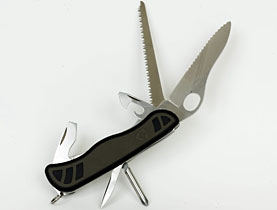
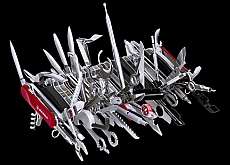
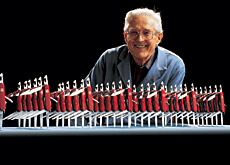
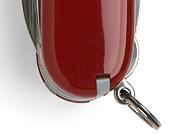
You can find an overview of ongoing debates with our journalists here. Please join us!
If you want to start a conversation about a topic raised in this article or want to report factual errors, email us at english@swissinfo.ch.